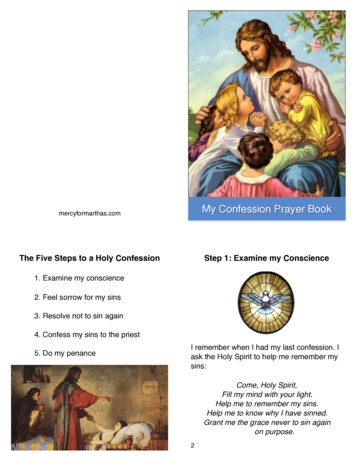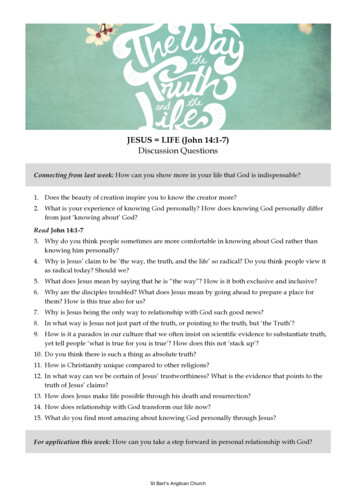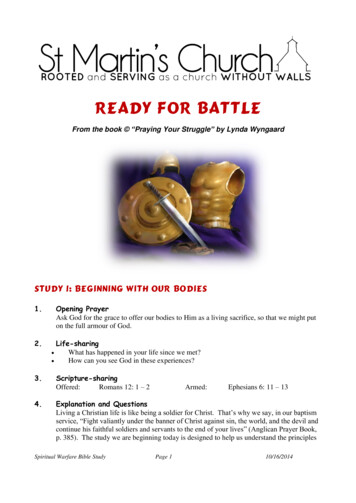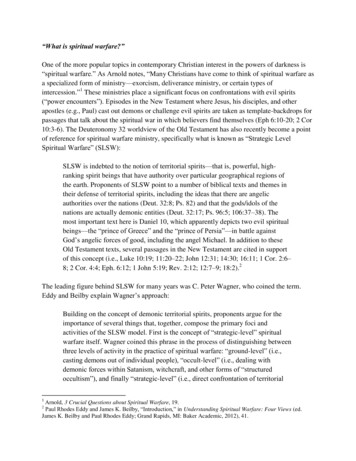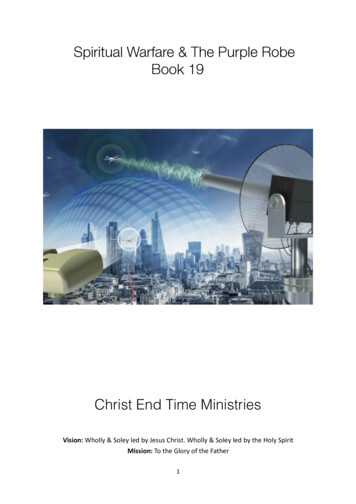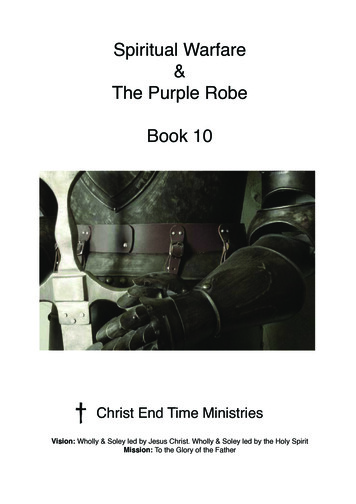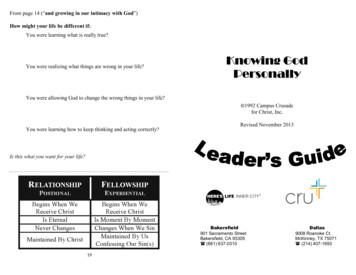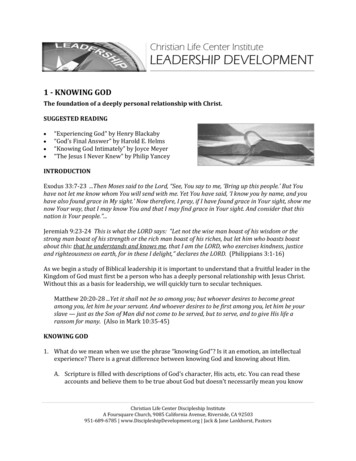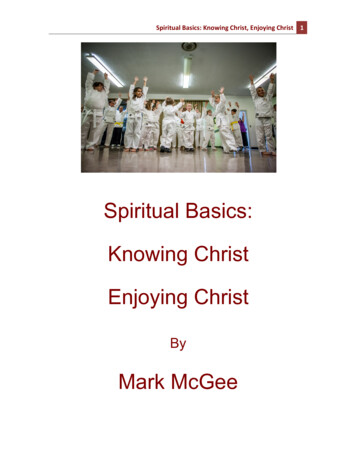
Transcription
tual Basics:Knowing ChristEnjoying ChristByMark McGee
ChaptersIntroduction3Spiritual Karate4Knowing Christ 16Knowing Christ 211Knowing Christ 318Knowing Christ 426Knowing Christ 531Enjoying Christ38
ductionOne of the great joys of teaching martial arts is to help studentsbecome followers of Jesus Christ. Becoming a disciplined followed ofJesus Christ is not an option for someone who calls themselves bythe name of Jesus Christ. Being a ‘Christian’ means believing whatJesus believed and doing what He said His followers should do.Just before Jesus ascended into Heaven, He told His followers that‘all authority’ had been given to Him. He described that authority asbeing all authority ‘in heaven and on earth.’ Jesus then told Hisdisciples, ‘Go therefore and make disciples of all the nations,baptizing them in the name of the Father and of the Son and of theHoly Spirit, teaching them to observe all things that I havecommanded you.” (Matthew 28:19-20)We could call that our‘marching orders’ as followers of Christ.So, how do we integrate those ‘marching orders’ into our martial artsprogram? Here’s an idea we’ve used in Grace Martial Arts for manyyears that may help you in your ministry to children and families.
Spiritual KarateWe call the program Spiritual Karate. However, it’s not spiritual in thesense that one may think about in a martial arts program.This training comes from a Christian ‘worldview.’My introduction to martial arts training in the early 1960s includedlessons in Hinduism, Buddhism, and Taoism. If I had heard the term‘Spiritual Karate’ back then, I would have thought of it in theframework of an Eastern mystical worldview. Even after becoming aChristian a decade later I struggled with the spiritual aspects ofmartial arts because of my training in Eastern mystical philosophy.That changed when I met a Christian Judoka in 1972 who belongedto a group called Judo and Karate for Christ. That’s what introducedme to the idea that a follower of Jesus Christ could train in martialarts and use it in evangelism and discipleship. We trained togetherand put on our first Christian martial arts demonstration that sameyear. How cool that was to use a skill set that interested people andgave us the opportunity to tell them that God loved them so much Hesent His only Son into the world, “that whoever believes in Himshould not perish but have everlasting life.” (John 3:16)
SpiritualBasics:KnowingChrist,EnjoyingChrist5That was more than 40 years ago. Judo and Karate for Christ is nowKarate for Christ International. Hundreds of thousands of Christiansaround the world are now training with Christian instructors anddeveloping in both faith and self defense. It’s the ‘faith defense’aspect of training that we’d like to focus on for awhile.We’ve broken spiritual training into four sections: Spiritual Basics Spiritual Forms Spiritual Defense Spiritual FocusEach section includes multiple categories and lessons. During thecoming weeks and months we’ll share some ways you can use thisspiritual training program, or something similar, in your ministry. Wealso invite you to consider using the program in other settings: familystudies, small group studies, children and youth studies, churchstudies, community studies, etc.The goal is simply this: following Christ as He wants us to follow Him.
Knowing Christ 1One evening long ago a ruler of the Jews by the name of Nicodemusapproached Jesus Christ. Nicodemus told Jesus he knew He was ateacher who had come from God because no one could do the signsthat Jesus performed unless was with Him. Jesus knew Nicodemus’heart and his real need, so He told Nicodemus that the only way tosee the Kingdom of God was to be ‘born again.’ Nicodemus looked atthings from a physical perspective, so he couldn’t understand howanyone could be born when he is old. “Can he enter a second timeinto his mother’s womb and be born?” (John 3:4)Jesus opened Nicodemus’ mind to the concept of a ‘spiritual’ rebirth –“Most assuredly, I say to you, unless one is born of water and theSpirit, he cannot enter the kingdom of God. That which is born of theflesh is flesh, and that which is born of the Spirit is spirit. Do notmarvel that I said to you, ‘You must be born again.’ The wind blowswhere it wishes, and you hear the sound of it, but cannot tell where itcomes from and where it goes. So is everyone who is born of theSpirit.” (John 3:5-8)
SpiritualBasics:KnowingChrist,EnjoyingChrist7As you might imagine, Nicodemus struggled to understand whatJesus was saying. He asked the Lord, “How can these things be?”“Jesus answered and said to him, ‘Are you the teacher of Israel,and do not know these things? Most assuredly, I say to you,We speak what We know and testify what We have seen, andyou do not receive Our witness. If I have told you earthly thingsand you do not believe, how will you believe if I tell youheavenly things? No one has ascended to heaven but He whocame down from heaven, that is, the Son of Man who is inheaven. And as Moses lifted up the serpent in the wilderness,even so must the Son of Man be lifted up, that whoeverbelieves in Him should not perish but have eternal life. For Godso loved the world that He gave His only begotten Son, thatwhoever believes in Him should not perish but have everlastinglife. For God did not send His Son into the world to condemnthe world, but that the world through Him might be saved. ‘Hewho believes in Him is not condemned; but he who does notbelieve is condemned already, because he has not believed inthe name of the only begotten Son of God. And this is thecondemnation, that the light has come into the world, and menloved darkness rather than light, because their deeds were evil.For everyone practicing evil hates the light and does not cometo the light, lest his deeds should be exposed. But he who doesthe truth comes to the light, that his deeds may be clearly seen,that they have been done in God.” John 3:10-21
Jesus introduced Nicodemus to a deeper understanding of ‘heavenlythings’ than the teacher of Israel had ever known before. Jesusquoted a portion of the Torah that Nicodemus had repeated andtaught many times, but gave him a new understanding that openedthe significance of what God was doing through Jesus Christ.Jesus said that God ‘loved the world’ so much (to such a degree) thatHe sent His ‘only begotten Son’ (one and only Son) into the world tobe ‘lifted up’ (crucified) so that everyone who ‘believes in Him’ (trustin Christ’s finished work on the Cross) would be saved and haveeverlasting life.What a remarkable statement! What we have here is God’s“Declaration of Purpose and Intent” concerning the people of thisworld. God wants people to ‘know’ Him and have a ‘relationship’ withHim. Even as God called out His people from bondage in Egyptthousands of years ago and saved them from the death of the ‘fieryserpents’ in the wilderness (Numbers 21), He was calling out peoplewho were in bondage to sin to save them from condemnation andeverlasting death.Jesus said that not everyone who hears this Truth will believe it.Jesus is the ‘Light’ who has come into the world, but many people willlove ‘darkness’ rather than the Light. Why? ‘because their deedswere evil’ and light exposes those evil deeds. However, the personwho does the Truth ‘comes to the light.’ The deeds of the ‘believer’ inChrist will be clearly seen, ‘that they have been done in God.’ To
ow’ God is to ‘glorify’ God.The first step in knowing Christ is knowing who He is. Jesus is Truthand the Light of the world. The second step is knowing what He did.He came to offer salvation to everyone who comes to Him believingthat He is sent from God. He came to save us from death and give uslife everlasting.In John 17, Jesus prays to His Father and equates ‘knowing’ Him witheternal life:“Father, the hour has come. Glorify Your Son, that Your Sonalso may glorify You, as You have given Him authority over allflesh, that He should give eternal life to as many as You havegiven Him. And this is eternal life, that they may know You, theonly true God, and Jesus Christ whom You have sent.” John17:1-3The Apostle Paul wrote that ‘knowing’ Christ was more important thananything this world could offer:“But what things were gain to me, these I have counted loss forChrist. Yet indeed I also count all things loss for the excellence of theknowledge of Christ Jesus my Lord, for whom I have suffered the lossof all things, and count them as rubbish, that I may gain Christ and befound in Him, not having my own righteousness, which is from thelaw, but that which is through faith in Christ, the righteousness which
is from God by faith; that I may know Him and the power of Hisresurrection, and the fellowship of His sufferings, being conformed toHis death, if, by any means, I may attain to the resurrection from thedead.” Philippians 3:7-11‘Knowing’ Christ in a spiritually personal way is where Christianitybegins. It is our first lesson – the most basic of basics. As Paul toldthe Philippian jailer – “Believe on the Lord Jesus Christ, and you willbe saved, you and your household.” (Acts 16:31) That’s where‘knowing’ Christ began for that jailer and his family. How does‘knowing’ Christ affect a person? This is how it affected the jailer –“he rejoiced, having believed in God with all his household.” (Acts16:34b) Knowing Christ personally as Lord and Savior fills abeliever’s heart with rejoicing. It will also impact the lives of thosepeople who know you best. They will see the change in your life andknow that you have met with God.‘Knowing’ Christ in a spiritually personal way also involves obedienceto Christ. If we believe Jesus Christ is the eternal Son of God, thenwe will obey Him.“Now by this we know that we know Him, if we keep Hiscommandments. He who says, ‘I know Him,’ and does not keepHis commandments, is a liar, and the truth is not in him. Butwhoever keeps His word, truly the love of God is perfected inhim. By this we know that we are in Him. He who says he
es in Him ought himself also to walk just as He walked.” 1John 2:3-6Do you ‘know’ Christ personally? If you do, you will agree with whatJesus Christ said about Himself. You will agree with what theapostles said and wrote about Christ. You will not agree with anyonewho says or writes anything less about Christ than what the Biblereveals about Him. You will rejoice in Christ and you will obey Christ.That’s basic Christianity. It’s where we begin.
Knowing Christ 2The Apostle Paul thought he knew a lot about God, but later admittedhe knew very little until he met Jesus Christ. Paul spent much of hischildhood in the early part of the 1st century AD studying to be aPharisee, which was the strictest sect of the Jewish religion at thetime. He rose to a position of authority within the ruling religious classof Israel and led a crusade to wipe out the early sect of people whobelieved a man known as Jesus of Nazareth was Israel’s Messiahand had risen from the dead. Paul hunted down the followers ofJesus and threw them in prison. The Book of Acts records that whena Christ-follower named Stephen was put to death, Paul cast his voteagainst them. Paul punished the followers of Jesus often in everysynagogue and compelled them to blaspheme. He admitted to beingso enraged against the followers of Christ that he persecuted themeven to foreign cities.It was on one of his journeys to a foreign city that Paul met Jesus forthe first time.“ as I journeyed to Damascus with authority and commissionfrom the chief priests, at midday, O king, along the road I saw alight from heaven, brighter than the sun, shining around me andthose who journeyed with me. And when we all had fallen to theground, I heard a voice speaking to me and saying in theHebrew language, ‘Saul, Saul, why are you persecuting Me? It
1SpiritualBasics:KnowingChrist,EnjoyingChrist3is hard for you to kick against the goads.’ So I said, ‘Who areYou, Lord?’ And He said, ‘I am Jesus, whom you arepersecuting. But rise and stand on your feet; for I haveappeared to you for this purpose, to make you a minister and awitness both of the things which you have seen and of thethings which I will yet reveal to you. I will deliver you fromthe Jewish people, as well as from the Gentiles, to whom Inow send you, to open their eyes, in order to turn them fromdarkness to light, and from the power of Satan to God, that theymay receive forgiveness of sins and an inheritance amongthose who are sanctified by faith in Me.” Acts 26:12-18Paul changed his alliances that day and never turned back. MeetingJesus will do that – change you forever.It wasn’t long before Paul was preaching Christ in the synagogues ofDamascus saying – “He is the Son of God” (Acts 9:20). The Jewswho heard Paul were amazed because they knew he had persecutedfollowers of Christ in Jerusalem and had come to Damascus to arrestpeople who believed in Christ to take them bound to the chief priest inJerusalem. “But Saul increased all the more in strength, andconfounded the Jews who dwelt in Damascus, proving thatthis Jesus is the Christ.” (Acts 9:22)
Fast forward many years and Paul is preaching Christ in the ancientcity of Philippi located in eastern Macedonia. He, along with fellowpreacher Silas, were arrested, beaten and thrown into prison. The citymagistrates commanded the jailer to keep Paul and Silas fromescaping, so the jailer put them into the inner prison and fastenedtheir feet in stocks. Paul and Silas were praying and singing when anearthquake struck about midnight. The foundations of the prison wereshaken, all the prison doors were opened and everyone’s chainswere loosed. The keeper of the prison woke from sleep, saw theprison doors open, thought the prisoners had escaped and drew hissword to kill himself. Paul called out to the jailer with a loud voicesaying – “Do yourself no harm, for we are all here.” The jailer calledfor a light, ran into Paul and Silas’ cell and fell down trembling beforethem. The jailer stood up and brought Paul and Silas out of the celland asked them a question that every human being should ask: “Sirs,what must I do to be saved?” Paul and Silas could have said a lot ofthings at that moment, but here’s how they responded to the sincerequestion about being saved – “Believe on the Lord Jesus Christ, andyou will be saved, you and your household.” (Acts 16:31)That’s what the jailer did. He believed (trusted) on the Lord JesusChrist and was saved. Paul and Silas spoke the Word of the Lord tomembers of the jailer’s household and they also believed “in God”(Acts 16:32-34) and were saved. When people believe on the LordJesus Christ they are believing in God.
1SpiritualBasics:KnowingChrist,EnjoyingChrist5Why did the jailer ask about ‘being saved’? Paul and Silas hadarrived in Philippi only a short time earlier, so how would the jailerknow about the need to ‘be saved’?Paul and Silas went out of the city on the Sabbath day to the riversidewhere worshippers of Jehovah went to pray. They talked with thewomen who met there each week. A woman named Lydia listened toPaul and the “Lord opened her heart to heed the things spoken byPaul” (Acts 16:14). She believed what Paul preached about Jesusand she and her household were baptized.A slave girl who possessed a spirit of divination followed Paul andcried out – “These men are the servants of the Most High God, whoproclaim to us the way of salvation” (Acts 16:17). The slave girlcontinued to do that for many days until Paul finally commanded thedemonic spirit to come out of the girl. The demon left the girl and shelost her ability to tell fortunes. Her masters saw that their hope forprofit was gone, so they seized Paul and Silas and dragged them tothe authorities, who brought the apostles to the magistrates. Paul andSilas were beaten with rods and thrown into prison. The magistratescommanded the jailer to keep them secure and “Having receivedsuch a charge, he put them into the inner prison and fastened theirfeet in the stocks.” (Acts 16:18-24) In the process of charging thejailer, the magistrates may have told the jailer the story about theslave girl and what she said about Paul and Silas proclaiming the‘way of salvation.’ The fact that Paul and Silas were praying and
singing hymns to God in prison and didn’t try to escape after theearthquake would have probably added to the jailer’s sense that theywere “servants of the Most High God, who proclaim to us the way ofsalvation.”We see in this story important basics about knowing Christ: Paul and Silas obeyed the leading of the Holy Spirit in travelingto Macedonia to preach the Gospel there (Acts 16:6-10). They immediately searched for people to share Christ with andpeople were saved. Demonic forces opposed Paul and Silas in what appeared to bepublic ridicule that eventually led to the apostles being arrested,beaten and imprisoned. While that may have been Satan’s planto stop Paul and Silas from preaching the Gospel, it did theopposite and expanded the outreach of the Gospel message toa government employee and his family. Paul and Silas told the jailer to ““Believe on the Lord JesusChrist, and you will be saved, you and your household.” Paul and Silas followed up the basic invitation by speaking “theword of the Lord to him and to all who were in his house.” The jailer and all of his family were saved and ‘immediately’baptized.Paul’s message was not the ‘easy-believism’ that many people trustin today. ‘Belief’ as a Christian includes hearing ‘the word of the Lord.’Paul detailed what it means to believe in these words to Christians in
:“But the righteousness of faith speaks in this way, ‘Do not sayin your heart, ‘Who will ascend into heaven?’ (that is, to bringChrist down from above) or, ‘Who will descend into theabyss?’ (that is, to bring Christ up from the dead). But whatdoes it say? ‘The word is near you, in your mouth and in yourheart’ (that is, the word of faith which we preach): that if youconfess with your mouth the Lord Jesus and believe in yourheart that God has raised Him from the dead, you will besaved. For with the heart one believes unto righteousness, andwith the mouth confession is made unto salvation. For theScripture says, ‘Whoever believes on Him will not be put toshame.’ For there is no distinction between Jew and Greek, forthe same Lord over all is rich to all who call upon Him. For‘whoever calls on the name of the Lord shall be saved.”Romans 10:6-13Believing in Christ includes ‘confessing’ Him as Lord and Savior and‘believing in your heart’ that God has raised Jesus from the dead,then ‘you will be saved.’ Why? “For with the heart one believes untorighteousness, and with the mouth confession is made untosalvation.”‘Knowing Christ’ means knowing Him as He really is, Lord andSavior, risen from the dead. It is not easy, but it is forever.
Knowing Christ 3“But now the righteousness of God apart from the law isrevealed, being witnessed by the Law and the Prophets, eventhe righteousness of God, through faith in Jesus Christ, to alland on all who believe. For there is no difference; for all havesinned and fall short of the glory of God, being justified freely byHis grace through the redemption that is in Christ Jesus, whomGod set forth as a propitiation by His blood, through faith, todemonstrate His righteousness, because in His forbearanceGodhadpassedcommitted, uslytimeHisrighteousness, that He might be just and the justifier of the onewho has faith in Jesus.” Romans 3:21-26The word the Apostle Paul chose to use for ‘righteousness’was δικαιοσυνη (justice, justness, verdict of judicial approval). Itcomes from the word δίκη (a judicial verdict). The idea was of a judgeapproving of something he had examined with his own eyes. The‘righteousness of God’ would be based on something He hadexamined with His own eyes and approved. It is a ‘divinerighteousness’ that carries the finality of the judgment of AlmightyGod.
�s important to understand how Paul arrived at this point. He told theRoman believers that he was “not ashamed of the gospel ofChrist, for it is the power of God to salvation for everyone whobelieves, for the Jew first and also for the Greek.” Then, Pauladdressed the issue of God’s righteousness – “For in it therighteousness of God is revealed from faith to faith; as it is written,‘The just shall live by faith.” (Romans 1:16-17) Paul used the sameword as in Romans 3:21, δικαιοσυνη.In the next verse Paul takes God’s verdict of approval and changes itto God’s verdict of disapproval – “For the wrath of God is revealedfrom heaven against all ungodliness and unrighteousness of men,who suppress the truth in unrighteousness.” (Romans 1:18) TheGreek word for ‘unrighteousness’ is αδικιαν (injustice, opposite ofjustice). It comes from the word ἄδικος (unjust, no justice, wicked).Paul used the word twice in verse 18. He said that God’s ‘wrath’ isrevealed from Heaven against all ungodliness and unrighteousnessof men, who suppress the truth in ‘unrighteousness.’ The ‘men’ Paulwrote about were ungodly and unrighteous and had ‘suppressed’(κατεχοντων – hold fast, hold back, hold down, bind, restrain, hinder)the ‘truth’ ‘in unrighteousness’ (αδικια).‘Righteousness’ is a primary theme of Romans. Paul used the words‘righteous’ and ‘righteousness’ almost 40 times in the letter – morethan any other New Testament writing. In fact, Paul’s use of thewords in Romans is more than almost all of the Old Testament
writings. Only Psalms, Proverbs and Isaiah use the words more oftenthan Romans. As for the words ‘unrighteous’ and ‘unrighteousness,’Romans uses the words more often than any other writing in theentire Bible!Paul began with the claim that the Gospel of Jesus Christ is ‘thepower of God to salvation’ and that ‘in’ the Gospel ‘the righteousnessof God is revealed from faith to faith.’ Here’s how Paul continued tobuild on that theme:“And even as they did not like to retain God in their knowledge,God gave them over to a debased mind, to do those thingswhich are not fitting; being filled with all unrighteousness ”Romans 1:28-29“ who, knowing the righteous judgment of God, that thosewho practice such things are deserving of death, not only dothe same but also approve of those who practice them.”Romans 1:32“But in accordance with your hardness and your impenitentheart you are treasuring up for yourself wrath in the day ofwrath and revelation of the righteous judgment of God, who ‘willrender to each one according to his deeds.” Romans 2:5-6“ but to those who are self-seeking and do not obey the truth,but obey unrighteousness—indignation and wrath, tribulation
2SpiritualBasics:KnowingChrist,EnjoyingChrist1and anguish, on every soul of man who does evil, of the Jewfirst and also of the Greek ” Romans 2:8-9“Therefore, if an uncircumcised man keeps the righteousrequirements of the law, will not his uncircumcision be countedas circumcision?” Romans 2:26“But if our unrighteousness demonstrates the righteousness ofGod, what shall we say? Is God unjust who inflicts wrath? (Ispeak as a man.)” Romans 3:5“What then? Are we better than they? Not at all. For we havepreviously charged both Jews and Greeks that they are allunder sin. As it is written: ‘There is none righteous, no, notone; There is none who understands; There is none who seeksafter God.” Romans 3:9-11Paul makes it clear that God has issued a judicial verdict and thatverdict is that ‘all are under sin.’ That’s Jews and Gentiles –everybody.“As it is written: ‘There is none righteous, no, not one; There isnone who understands; There is none who seeks afterGod. They have all turned aside; They have together becomeunprofitable; There is none who does good, no, not one.’ ‘Theirthroat is an open tomb; With their tongues they have practiced
deceit’; ‘The poison of asps is under their lips’; ‘Whosemouth is full of cursing and bitterness.’ ‘Their feet are swift toshed blood; destruction and misery are in their ways; And theway of peace they have not known.’ ‘There is no fear of Godbefore their eyes.” Romans 3:10-18That pretty well sums it up for everyone. That’s how God sees thehuman race. He has examined the race and declared a judicialverdict of disapproval.“Now we know that whatever the law says, it says to those whoare under the law, that every mouth may be stopped, and allthe world may become guilty before God. Therefore by thedeeds of the law no flesh will be justified in His sight, for by thelaw is the knowledge of sin.” Romans 3:19-20Fortunately for us, God is a loving, forgiving judge. Even though noflesh will be justified in His sight ‘by the deeds of the law,’ God hasprovided a way for sinful beings to receive a judicial verdict of‘approval’ from God.
2SpiritualBasics:KnowingChrist,EnjoyingChrist3The Grace and Mercy of God“But now the righteousness of God apart from the law isrevealed, being witnessed by the Law and the Prophets, eventhe righteousness of God, through faith in Jesus Christ, to alland on all who believe. For there is no difference; for all havesinned and fall short of the glory of God, being justified freely byHis grace through the redemption that is in Christ Jesus, whomGod set forth as a propitiation by His blood, through faith, todemonstrate His righteousness, because in His forbearanceGodhadpassedcommitted, uslytimeHisrighteousness, that He might be just and the justifier of the onewho has faith in Jesus.” Romans 3:21-26I bow in amazement at these words. After all that Paul explainedabout the righteousness of God and the unrighteousness of humanbeings, Paul introduced the righteousness of God that is ‘apart fromthe law.’ It is the righteousness of God that comes ‘through faith inJesus Christ, to all and on all who believe.’ The word ‘believe’ is atranslation of the Greek word πιστεως (firmly persuaded, convictionbased upon hearing, come to trust). The word also carried the idea ofa guarantee (warranty) in ancient times. The meaning in context is of‘divine persuasion’ and ‘guarantee.’
Paul carefully argues for man’s inability to ‘deserve’ or ‘earn’ his wayinto God’s judicial approval – “There is none righteous, no, notone; There is none who understands; There is none who seeks afterGod. They have all turned aside; They have together becomeunprofitable; There is none who does good, no, not one.” Paulsummed up his argument with this powerful statement – “for all havesinned and fall short of the glory of God.” The best we can hope for isto receive mercy from the Judge and mercy is what we receive.God is Just and the Justifier ‘through the redemption that is in ChristJesus.’ God set forth Jesus as a ‘propitiation by His blood’ todemonstrate ‘His righteousness.’ The word ‘propitiation’ is atranslation of the Greek word ιλαστηριον (a sin offering to appease,coveringforsin),whichderivesfromtheword ἱλάσκοµαι(appeasement, satisfaction, show mercy by satisfying, conciliate),which derives from the word ἵλεως (merciful, forgiving, appeasing).The mercy of God in forgiving the sins of ‘all who believe’demonstrates His righteousness – “because in His forbearance Godhad passed over the sins that were previously committed, todemonstrate at the present time His righteousness.”An important ‘basic’ in knowing who we are as Christians is ‘knowingChrist’ and what He provided for us. We are the ‘forgiven;’ forgiven byGod. We were sinners who fell ‘short’ of the glory of God. We havebeen justified freely by His grace through the redemption that is inChrist Jesus.
ord‘redemption’isatranslationoftheGreekword απολυτρωσεως (buying back from, a release effected bypayment of ransom). Christians are the ‘redeemed’ because Jesuspaid the price for buying us out of spiritual bondage to sin (“For wehave previously charged both Jews and Greeks that they are allunder sin” Romans 3:9). God ‘in His forbearance’ passed over thesins we previously committed, ‘to demonstrate at the present time Hisrighteousness, that He might be just and the justifier of the one whohas faith in Jesus.’One more thing we need to know – there is no room for ‘boasting’ onour part. All credit, all glory and praise go to the God of our salvation.“Where is boasting then? It is excluded. By what law? Ofworks? No, but by the law of faith. Therefore we conclude that aman is justified by faith apart from the deeds of the law.”Romans 3:27-28
Knowing Christ 4“For no other foundation can anyone lay than that which is laid,which is Jesus Christ.” 1 Corinthians 3:11The FoundationThe concept of “foundation” in the Bible goes back to God’s throne inHeaven.“Righteousnessandjustice are thefoundationofYourthrone; Mercy and truth go before Your face.” Psalm 89:14The Hebrew word translated “foundation” in this verse is ( מָכוֹן makon)and means “a fixed or established place, dwelling place, settledplace, habitation, foundation.” It comes from the word ( כּוּן kun), whichmeans “to be firm.”The first clue in Scripture that Jesus Christ is God’s “foundation” forsalvation is found in Luke 6 where Jesus spoke to a great crowd ofpeople who had come to Him for healing.“Whoever comes to Me, and hears My sayings and does them,I will show you whom he is like: He is like a man building ahouse, who dug deep and laid the foundation on the rock. Andwhen the flood arose, the stream beat vehemently against that
e, and could not shake it, for it was founded on therock. But he who heard and did nothing is like a man who builta house on the earth without
16:34b) Knowing Christ personally as Lord and Savior fills a believer’s heart with rejoicing. It will also impact the lives of those people who know you best. They will see the change in your life and know that you have met with God. ‘Knowing’ Christ in a sp
